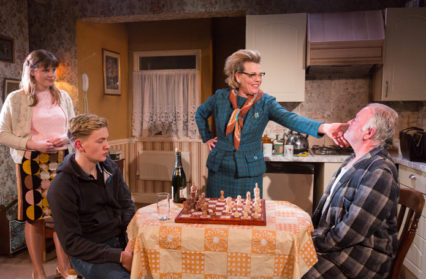Jafar Iqbal reviews the latest production from Cardiff’s award-winning pub theatre, The Other Room, All But Gone.
Dementia has dominated Welsh theatre in the early part of this year, with at least four plays tackling the subject so far. Thematic links between all of them are obvious and inevitable but, tonally, this Valleys-set drama sits alone from the pack. The illness does have a significant role in Matthew Trevannion’s narrative but, crucially, this is not a play about disease.
Rather, All But Gone is a love story playing in repeat. When Owen’s lonely world is disturbed by belligerent teenager Kai, the old man opens his door and his heart to the wayward boy. The surrogate son brings new purpose to Owen’s life but with that comes a nostalgia for the past – of lost loves, failed loves and missed opportunities. As his past begins to appear clearer than the present, cleverly symbolised by a simple yet effective lighting design from Joe Fletcher, the true extent of Owen’s guilt starts to unravel.
There is a responsibility on theatre-makers not to trivialise or misrepresent illnesses like dementia, and that duty of care for the audience often backs them into a corner. Trevannion dares to push that boundary, successfully fashioning a script that treats the illness as a theatrical device rather than the focal point. Owen’s deteriorating mind is merely a gateway into what is an achingly tragic love triangle. Completing that triangle are Howell and Bev, themselves trapped and looking to Owen for escape.
The beauty of Trevannion’s writing lies in his character development. Each of the four leads is nuanced and relatable, immersing the audience into the play almost immediately. Trevannion also has a good ear for the Valleys accent and, even at its most conversational, there is a beautiful lyricism to the text that director Dan Jones manages to tap in to. This is particularly apparent during the family scenes, where conversation zips around the stage with a pleasing musicality.
At the heart of it is Wyn Bowen Harries as Owen. On stage for the duration of the play, Harries is a captivating presence both in his delivery and chemistry with the rest of the cast. The character’s descent into dementia is painful to watch but truly heart-breaking is watching his earlier life fall apart, and Harries plays it all with an exquisite subtlety. He also has the benefit of a very strong supporting cast. Daniel Graham and Elin Phillips both give deliberately restrained portrayals of what are complex roles, while Nicola Reynolds provides much-needed levity in a brief cameo. Callum Hymers has the privilege of sharing the stage with these established actors, which is no easy feat, but the young man takes a difficult role and gives a performance that is well beyond his years.
A performance is only as good as the direction given, though, and the last word is reserved for Dan Jones. Having the added pressure of presenting his first season as Artistic Director, Jones has given his best directorial effort to date. He showed his knack for getting understated performances in BLINK but takes it one step further here with a similar approach to sound and lighting. What isn’t understated is the set – Carl Davies’ design is astonishing and shows great attention to detail from Jones. Inheriting The Other Room meant filling some extremely big shoes, and there was a lot of trepidation about the direction that this reputable theatre would take. All But Gone shows that, if nothing else, the quality shows no signs of falling. Unlike its central character, the play shows that The Other Room has both a clear understanding of its past, and a clearer understanding of its future.
(Image credit: Kieran Cudlip)
You might also like…
Gareth Kent reviews series 10 of whimsical BBC comedy radio drama, Curious Under the Stars.
Jafar Iqbal is a regular contributor to Wales Arts Review.












